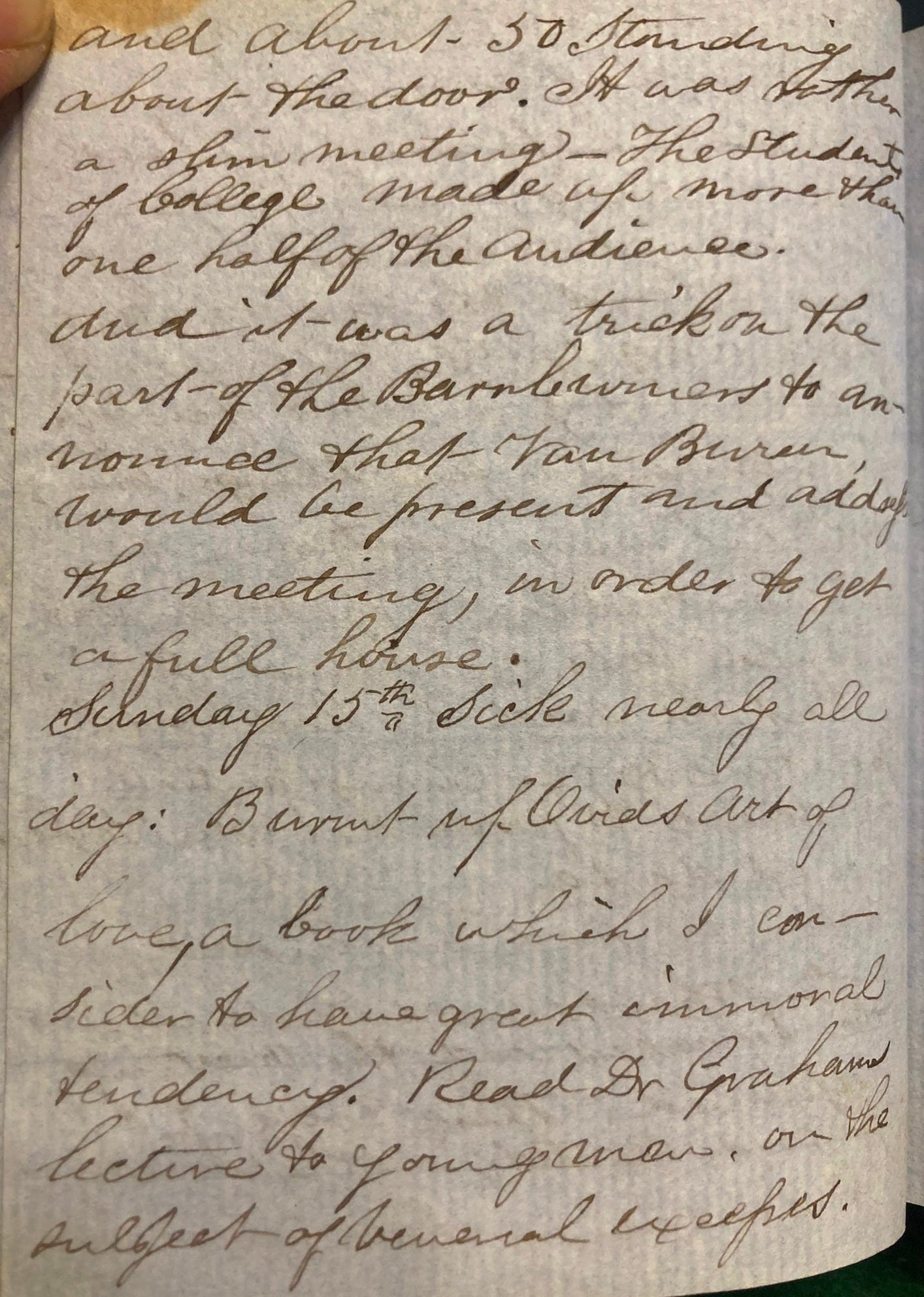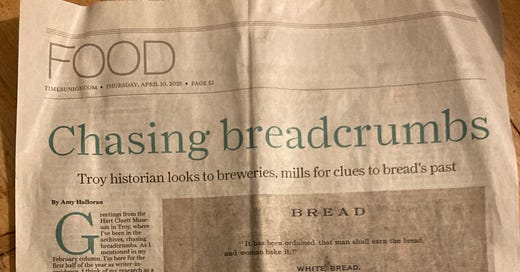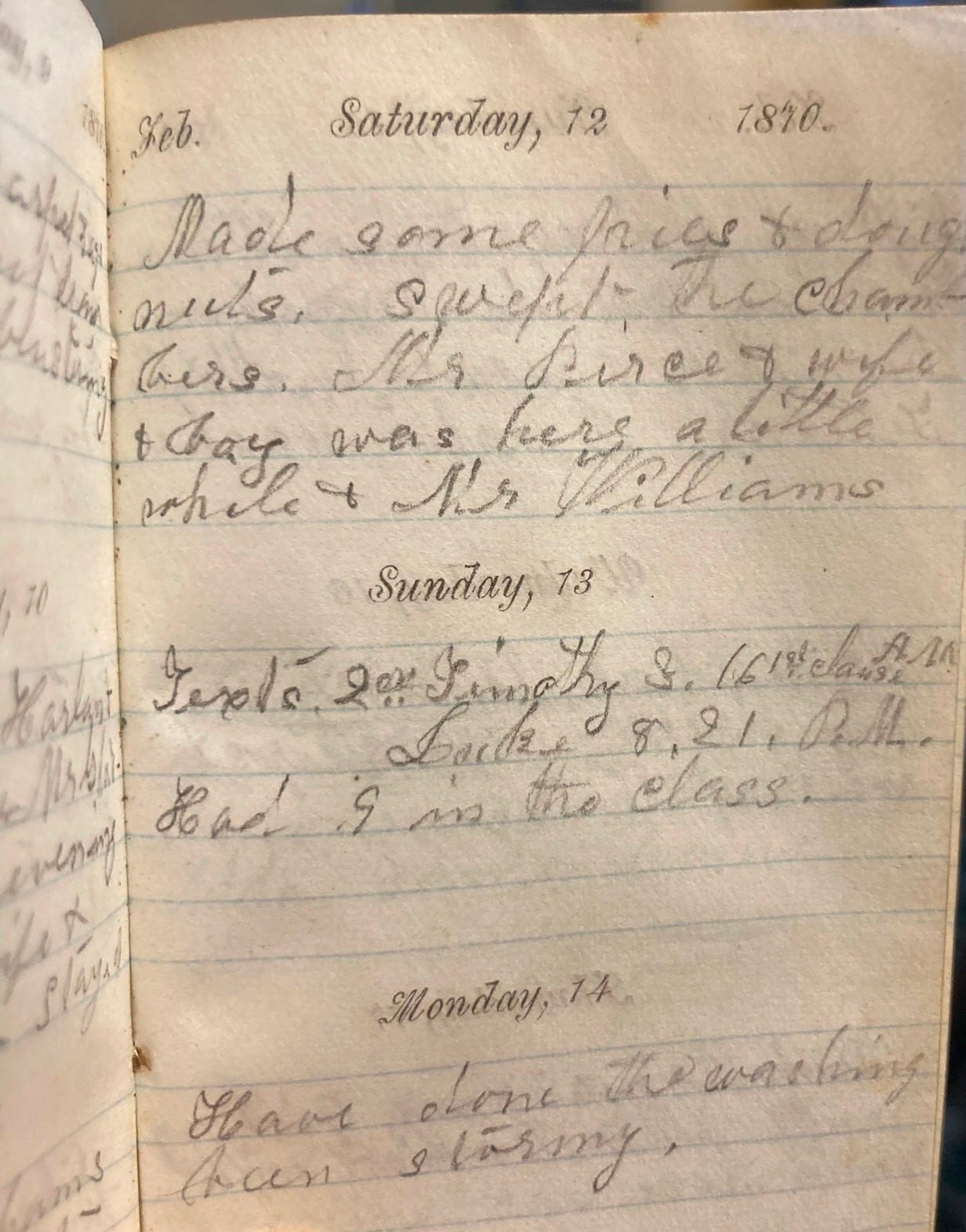Dear Bread Fans,
I’ve been having a good time at the Hart Cluett Museum, looking for clues to people and bread. My dear friend Ellie encouraged me to pitch an article to the Times Union, my local paper, about my time in the archives, but I was hesitant.
I thought my bread people were all right here, gathered up around this loaf of a letter, butter in hand, toast on plate, ready to read.
I was wrong!
What fun to have friends and strangers reach out to me after my column ran last week. I got texts and emails, and stopped in the street. People told me family stories about prohibition era bread deliveries, and the loaves held secret bottles of booze. I heard a story about rye straw I cannot wait to investigate. What a pleasure to have what interests me interest others.
Here is a link to the article in the paper: Chasing Breadcrumbs. And here it is in a document.
Yesterday, I had a delightful workshop at the museum. We looked at pages from diaries of people who were famous in Troy and unknown, studying what they decided to write, and noticing things that read strangely to us, like a store closing for the cashier’s funeral.
So many diaries are mostly records of incidentals — the weather and chores, records of social calls. In the midst of these mundanities, a trolley car strike was mentioned, and the battle of Vicksburg — not in the same diary, but two separate ones.
How will news of today’s broken and brutal world filter into the everyday-ishness of our records?
I do not keep a diary. I tried when I was young, but I couldn’t make the habit. When I remembered, I’d race backwards and fill in the pages, writing “Today was good,” on each one, regardless of whether the day was good, meh, or wretched. I don’t know if I thought my diary would be part of a Judy Blume book or an ABC afterschool special, or why I thought that abstract audience deserved a positive note about each day. But I had a sense that I should remember my days in a positive light.
I write irregularly in my notebooks now, but feel no compunction to make my words upbeat or anything at all. I try to be novelistic in my gaze, catching things that seem worthy. I write down my dreams, which very often seem like stories.
Reading these diaries & leading this class has been an inquiry into the habit. If you keep one, what do you include? Big events? Big emotions?

Here are the notes from my class, in case you’d like them.
Yours, Amy
Reading the Invisible
Our everyday lives evaporate, but writing remains. This workshop is a reflection on the impressions we leave behind, and an inspiration to begin or deepen the habit of journaling.
Diarists may simply note chores and the weather, only occasionally touching on broader topics. But every snapshot, each sentence offers a window into another person’s life. What remains of those who were not famous? What was their audience?
These questions matter on their own, and also, to us as we think about our own writing. Why do we undertake our own reflective practices? Is it to be in touch with yourself? Track progress? Settle emotional struggles? Does keeping a diary work as a meditation practice? Keep you connected to what you see and feel?
Prompts:
Consider why you feel called to write in a journal. Think of yourself writing daily, or many times a week, in a given place – at home, at a library, in your car between commutes. What kind of reflections do you want to make?
Describe the weather. Take the simple basics of temperature, how the sky looks, and what it feels like to be in this climate right now.
Describe your meals. Choose a meal a day to focus on and describe what is on your plate, how it got there – did you make it, did someone else? When did you shop for the ingredients?
Think of a recipe you know by heart. A go-to meal that doesn’t take much effort or imagination but is a solid comfort. How did this food come to reside in your life?
Tune in to people. As you go about your days, listen for snippets of dialogue – from a colleague, a clerk, someone in line at Stewart’s. Write down their words as soon as you can. Describe what this person is wearing, and why their words caught you.
Tune in to nature. What is happening with the trees and flowers around you? What birdsongs do you hear? Imagine being a part of the natural world – being a flower blooming. Try to put words into the plants’ mouths.
What do you do every day? Choose a habit and write about it as if you were writing a letter to a friend – conjure a time when there weren’t cellphones and write a pretend letter describing this routine to a friend. Be surprised by yourself.
What do you do when the seasons change? Describe gardening, cleaning, cooking habits that take place as time and weather turns.
Slow down and look at your kitchen, your dining room, your bedroom. Describe it to yourself as if you were someone else.
Write about your morning to someone in another country. A pretend penpal in another part of the world. Invite them into your feelings, or not. This can be personal, or just an invitation to bring an imaginary person into your day.
Further reading:
The American Diary Project is dedicated to housing and presenting diaries of ordinary people. Many from their collection are available to view online!
The Marginalian has a good post about Virginia Woolf as a diarist.
The Wheeling Year: A Poet’s Field Book by Ted Kooser
Elissa Altman, author of Permission had a recent post about journaling I really enjoyed.






Can’t wait to hear about homemade yeast, and how hops are involved. Congrats, Amy!
Nice work! And thanks for sharing your inspiring notes and prompts. I’ve been journaling on a near-daily basis for the past decade, sketches and scraps and stories and, lately, a micro hot-take on current events in the unlikely event future generations stumble on my notebooks. Maybe a little Anne Frank-ish?